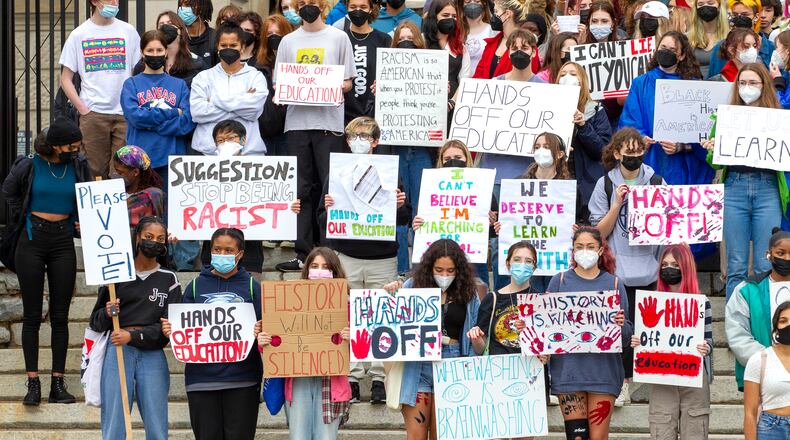Adunni Noibi is a sophomore at North Gwinnett High School. She works with the Georgia Youth Justice Coalition to achieve equity in her community and schools.
In this essay, Adunni criticizes bills in the General Assembly that she says undermine equity.
By Adunni Noibi
Growing up as a young Black student in Georgia public schools, I sat beside and learned from people of all kinds. My county of Gwinnett is the most diverse in the state, with 144,000 students of color like me in the public school system.
I know the importance of true and raw history. Learning about horrors like slavery and discrimination is never pleasant — but it is powerful. It is what binds us together as we look forward to America’s future and strive to make it one where we can all succeed.
Credit: Courtesy photo
Credit: Courtesy photo
But right now in Georgia, there are several bills targeting Black history — my history. These classroom censorship bills tell people like me, “You’re just not American enough.” They’re just like bills that criminalize protest, suppress voters of color and entrench oppression against people like me.
One bill would fine public schools that refuse to ban discussions of white supremacy. Some criminalize librarians if they don’t remove Toni Morrison from the bookshelves. Some ban teachers from receiving training on inclusion and anti-racism.
I know racism isn’t just historic because I live it every day.
When legislators imposed austerity cuts to state funding for schools for two decades, which is longer than my lifetime, it disproportionately impacted majority-minority schools like mine and those across the Black Belt of South Georgia. That was racism. When none of my teachers look like me, that’s racism. And when we pass laws that affirm this bigotry, that’s systemic racism — the very form of racism our legislators deny exists.
As a Black student who has sat in Georgia classrooms since I was 6, this resonates with me because it seems like bigoted politicians don’t care about my right to learn factual history and history that still affects me today. Racism isn’t when we acknowledge race — it’s when we erase it, erase our history.
For history to not repeat itself, we must educate ourselves on everything that has happened, positive or negative. Instead of hiding behind a version of a perfect America that has no flaws facade, we must face these issues head on. That requires honest education. My peers and I should not have to skip class or spend our afternoons fighting and pushing for our right to learn — but we will, and we are.
Hundreds of students gathered at the Capitol recently to protest these bills. They spoke out, marched, and called legislators. College students are testifying at committee hearings about the importance of protecting free speech. Georgia’s youth know exactly what these classroom censorship bills attack — the American history of Black people.
If these bills pass, teachers will have to pull books off their shelves and strike history from their lessons. Books like “The Hate U Give” or “The Bluest Eye” express the reality of living as a Black person in America. I deserve the right to read them, and so do my younger sisters and brothers.
I go to school in a place where plantations once stood, where monuments to Confederate leaders and slaveowners still stand. I didn’t have a school board that looked like me until last year. America’s history isn’t perfect because perfection isn’t the point. The point is to learn.
School is the place for us to learn, grow and thrive. It’s where we equip the youngest Americans to build our future. Erasing my people’s history is a threat to that future. Whether we’re talking about oppression 200 years ago, a Klan rally in the 1980s just miles from my house, or the racism we see in our nation to this day, censoring that education is an attack on young Americans like me.
When these politicians stand up and say they’re fighting for the children by banning history, I know they’re lying. Because when I look around at the children in my community, I see immigrants and Black Americans, I see queer and trans youth, and I see Hispanic and Asian American children. I see white children who want to learn the truth, and I see people of all ages who just want to learn about the world.
Which of those children are politicians pretending to fight for?
About the Author
The Latest
Featured




